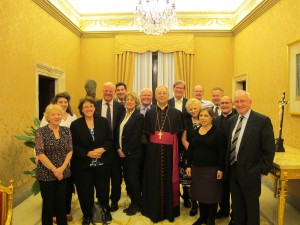25th October 2013
UK Parliament comes to the Holy See


One intangible measure of the strength of a bilateral relationship is how far relations go beyond strict government to government formalities. Relations between the United Kingdom and the Holy See received a boost this week with a visit by 12 members of the All Party Parliamentary Group on the Holy See (APPG for short).
The APPG, set up in Parliament in 2004 and now with over 50 members, exists to help further the relationship between the UK and the Holy See. The visiting delegation included Members of Parliament from all three main political parties, as well as three members of the House of Lords, from all parts of the United Kingdom, under the chairmanship of Sir Edward Leigh MP. As Sir Edward told Vatican Radio at the end of the trip, this sixth visit by the APPG to the Holy See was the largest to date, with a more substantial programme, than at any time previously.
The APPG paid the calls you would expect: on senior officials in the Secretariat of State to hear about the Holy See’s external relations (from Syria to Colombia) and internal Vatican reforms; on Cardinal Turkson at the Pontifical Council of Justice and Peace to discuss social justice concerns; and on Archbishop Muller at the Congregation for the Doctrine of the Faith to hear the latest views on key ethical and moral issues. They joined a crowd of over 100,000 pilgrims in St Peter’s Square for Pope Francis’ weekly audience. However, calls were also paid outside the formal Vatican structures. For example, the APPG had a lively discussion at Caritas Internationalis on poverty, migration and refugee issues; and at the Sant’Egidio Community looking at how non-governmental actors can play a role in conflict prevention and reconciliation in Africa, Latin America and the Middle East.
There will be plenty of follow up, on issues as varied as violence against women, food and nutrition, the Middle East peace process, AIDs / HIV care, and the death penalty. Some of these will be taken forward between the UK and Holy See governments. Others, less formally but no less effectively, through contacts made and renewed between parliamentarians and Rome-based organisations and individuals. In a speech I gave during the visit, I said that Britain has nothing to lose and much to gain from developing further its relationship with the Holy See. Visits like that of the APPG show why.